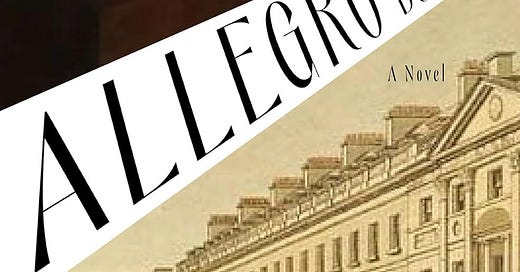Allegro by Ariel Dorfman (English language edition published by Other Press, 2025).
The first thing you should know about Ariel Dorfman’s Allegro is to take the blurb on the back with a large grain of salt.
That blurb tells us that the book is a “thrilling historical mystery starring Mozart.” It does indeed star Mozart, but to my mind, “thrilling historical mystery” is misleading. It gives the impression of a composer-as-detective following clues, interviewing witnesses, and ultimately tracking down a criminal.
Allegro doesn’t follow this template at all. The suspected criminal in the case doesn’t even appear in the book; rather, it’s his son who follows Mozart around, like a “Columbo” villain trying to keep a close eye on the rumpled lieutenant. And the novel is no tightly plotted detective story, but rather a lush and lingering meditation on life, death, family, friendship, God, and music.
The mystery in the book, such as it is, is based on a real historical coincidence: the tragic fact that both Johann Sebastian Bach and George Frideric Handel were blinded by a quack surgeon calling himself the Chevalier John Taylor. (The description of Bach’s surgery here is brief but gruesome.) In Bach’s case, the surgery led not only to blindness but also to death.
Not surprisingly, Bach’s son Johann Christian has some very bitter feelings about the Chevalier. But the quack’s son, Jack Taylor, is determined to restore his father’s reputation, and he appeals to young Wolfgang Amadeus Mozart, Christian’s protege, to help him.
The story visits Mozart at various crises in his life: the point in his childhood when he’s beginning to feel the weight of being the family breadwinner; the final illness and death of his beloved mother in Paris when he’s a young man; and a moment in Leipzig in 1789 when he’s having disturbing premonitions of his own early death, just a couple of years away.
So the stressed and anxious Mozart of this story has little in common with the more upbeat Mozart we see in many of the books and films about him. Although we do still get the poop jokes. Mozart and his family had two obsessions that show up in virtually every work about him: sublime music and poop jokes. Don’t ask me why; I don’t get it either. People are complicated.
Anyway, during each of these crises, Jack Taylor pops up again, begging Mozart to help him connect with Christian Bach so that he can explain the truth behind the Chevalier’s actions. His version of the facts, when we finally get it, is so outlandish that one wonders how he can believe it himself. Yet even then Mozart is reluctant to condemn him, and the young composer works toward a resolution that, if not completely harmonious, will bring some sort of relief to everyone involved. He is rewarded with an unexpected encounter that brings a measure of peace to his own troubled heart.
Dorfman tells this strange, dreamlike story in run-on sentences and florid prose that take some getting used to. But his Mozart makes an appealing hero, naive and brash at times, yet genuinely seeking truth, beauty, and goodness in his own stumbling way. “I think the answer is always music, I think we must always seek answers there when we are most lost, most bereft,” he tells his mentor Christian Bach at one point. If his story is not exactly the thrilling historical mystery promised on the back cover, words and ideas like this make it an intriguing read nonetheless.
Book Links:
Allegro on Amazon
Allegro on Bookshop
(Note: As an Amazon Associate I earn from qualified purchase.)
Goodreads Links:
Ink Ribbon Red by Alex Pavesi
Other Links:
At Christ and Pop Culture, I reviewed the Netflix documentary Don’t Die: The Man Who Wants to Live Forever.




Our family talks easily about poop too but only because I have Crohns Disease. I wonder if something similar happened in their family? Thank you for this review and a different angle into Mozart's life.